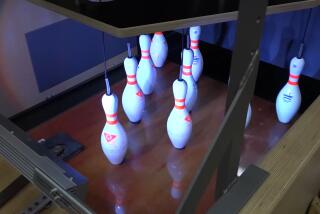Pool-Table Maker Racks Up Profit After Slimming Down
For a while, it seemed, Don Brostoski was behind the eight ball.
His company, Golden West Billiard Mfg. Inc. of Canoga Park, is a leading maker of pool tables, a business that once was tied firmly to the housing industry. In 1982, when the economy was bad and housing construction plunged, privately held Golden West chalked up a loss. Not only did orders slump, but retailers couldn’t pay for tables they already had.
Golden West is racking up profits again, but it is a much smaller company now in an industry that has been shrunk by changing times and, possibly, market saturation.
Indeed, American pool-table makers turned out about 230,000 tables in 1981, according to Michael Panozzo, editor of Billiards Digest. For 1985, he estimated, the figure was down to 50,000 or 60,000, where it languishes despite the recovery of the housing industry.
Industry experts cite several reasons for the decline. For one, more people prefer athletic recreation these days. For another, experts say, strong sales during the 1970s have dampened demand for new pool tables.
Also, many people just don’t have room for a pool table. Panozzo noted that many of the new homes built during the last decade were in Sun Belt states, where basements are less common than in the Northeast and Midwest.
History Mirrors Industry
Golden West’s history mirrors the industry’s sufferings. About six years ago, Golden West had 90 workers and sales of $9 million. Now the staff is down to 60, and sales are about $4.5 million, $1 million of which comes from the company’s retail store.
Golden West doesn’t make just ordinary pool tables. Its tables are all full-size, and nearly all are made in the ornate, antique style of tables used 100 years ago. For undetermined reasons, demand for antique-style tables has been stronger than for regular tables, according to several manufacturers.
5,000 Tables a Year
Brostoski started Golden West in 1966 as a business that bought, restored and sold antique pool tables. Gradually it started manufacturing tables. They sold well, Brostoski said, so Golden West eventually became a manufacturing company, now turning out 5,000 tables a year that retailers sell for $1,400 to $5,000.
Brostoski asserted that his company is “by far” the nation’s largest maker of antique-style pool tables, a claim that is difficult to verify. Golden West, however, is certainly among the largest in the business.
Pool comes naturally to the portly, cigarette-smoking Brostoski, who took his cue from his father, a former poolroom operator in Long Beach. Brostoski spent plenty of time in pool halls as a youth and learned the business from the inside. He also learned to be a pretty fair pool player.
“I’ve been playing this game since I was 8 years old,” he said.
Pool halls aren’t what they once were, however. The industry now focuses on sales to facilities such as suburban recreation centers, bowling alleys, bars, colleges and military bases. Brostoski said many of his tables also go into condominium developments and trailer parks.
$10-Million Annual Sales
Brunswick Corp., which says it has been in the pool table business since 1845, appears to remain the overall industry leader, selling about $10 million of mostly smaller, less-expensive tables annually. But it doesn’t make them anymore, it buys them from Wurlitzer.
There are roughly a dozen companies that lead the pool-table industry, and total sales of tables and supplies are about $100 million a year, according to Kim Gandy, president of Gandy’s Industries in Macon, Ga. Gandy’s, like Golden West, is a leader in the market for higher-priced, regulation-size tables, and Gandy’s has a big share of the coin-operated market.
Regulation-size pool tables have several qualities in common, although not necessarily green felt--the felt can be any color. The regulation-size tables are big, roughly 50 inches by 100 inches, and heavy, about 1,500 pounds. Beneath the felt, they have flat, heavy slate slabs.
Millions Still Play Game
Although the pool table business isn’t what it used to be, millions of Americans still play the game. A 1984 survey by the National Sporting Goods Assn. found that 21.5 million people played it at least once that year, 3 million for the first time.
If the pool business ever goes completely sour, Brostoski has a cushion: In 1979, to take his mind off pool, he bought Sherman Oaks Honda, which sells Honda motorcycles and scooters.
Last year Brostoski’s Honda business grossed $2.2 million, and grew so successful that his wife now runs it full time.
More to Read
Inside the business of entertainment
The Wide Shot brings you news, analysis and insights on everything from streaming wars to production — and what it all means for the future.
You may occasionally receive promotional content from the Los Angeles Times.









